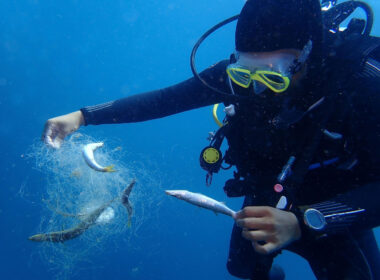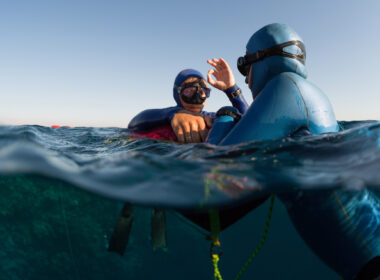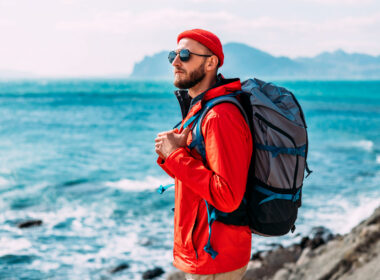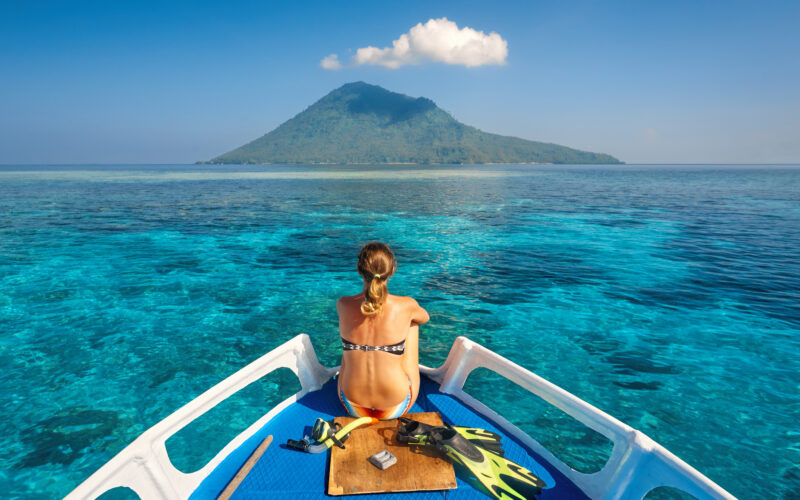Have you ever dreamt of exploring the islands and diving Indonesia? A dream destination for scuba diving and freediving enthusiasts alike, Indonesia offers some of the most diverse and spectacular underwater environments in the world.
5 Facts You Need to Know Before Diving Indonesia
1. It’s a diverse country with a rich culture
Indonesia is home to over 300 ethnic groups, each with its unique customs, traditions, and languages. The country’s rich cultural heritage is reflected in its architecture, art, music, dance, and cuisine. From the elaborate Hindu temples of Bali to the intricate batik fabrics of Java, Indonesia’s cultural diversity is a testament to its fascinating history.
2. It’s the world’s largest archipelago
Indonesia is made up of over 17,000 islands, which are home to a diverse array of ecosystems and wildlife. From the lush rainforests of Sumatra to the pristine coral reefs of Raja Ampat, Indonesia’s natural beauty is breathtaking. The country is also home to several active volcanoes, including Mount Merapi, which erupted in 2018.
3. It’s a paradise for outdoor enthusiasts
Indonesia’s diverse natural landscapes make it a popular destination for outdoor activities such as hiking, surfing, and scuba diving. The country’s many national parks and nature reserves offer opportunities to see unique wildlife such as orangutans, komodo dragons, and tigers.
4. It’s a land of delicious cuisine
Indonesian cuisine is a fusion of flavors and influences from China, India, the Middle East, and Europe. Some popular dishes include nasi goreng (fried rice), satay (grilled meat skewers), and rendang (spicy beef stew). Indonesian cuisine is also known for its use of spices, such as turmeric, ginger, and lemongrass.
5. It’s a predominantly Muslim country
Indonesia is the world’s largest Muslim-majority country, with over 87% of its population practicing Islam. However, the country is also home to significant populations of Christians, Buddhists, and Hindus, among other religions. Indonesia’s religious diversity is reflected in its architecture, art, and daily life.
Scuba Diving in Indonesia
Indonesia’s dive sites are among the best in the world, attracting divers from all corners of the globe. With a warm and tropical climate all year round, Indonesia’s waters offer clear visibility and an abundance of marine life. When diving Indonesia, destinations you should include are:
Raja Ampat: Located in the West Papua province, Raja Ampat is home to more than 600 species of coral and 1,700 species of fish. Divers can explore the area’s diverse marine life and stunning coral gardens, as well as encounter large pelagic species such as manta rays, whale sharks, and hammerhead sharks.
Komodo National Park: The waters around Komodo National Park are famous for their strong currents, which bring in nutrient-rich waters and attract a wide variety of marine life. Divers can expect to see everything from small nudibranchs to large pelagic species such as manta rays, sharks, and even the occasional passing whale.
Bali: Bali’s scuba diving sites offer something for everyone, from shallow coral gardens to deep drop-offs. The island is home to a variety of marine life, including pygmy seahorses, frogfish, and reef sharks.
Freediving in Indonesia
For those who prefer to explore the underwater world without the use of tanks, freediving in Indonesia is becoming more and more popular with evermore training centers opening around Indonesia each year. Some of the best freediving destinations in Indonesia include:
Gili Islands: Located off the coast of Lombok, the Gili Islands offer calm and clear waters that are perfect for freediving. Divers can explore the area’s vibrant coral reefs and encounter a wide variety of marine life, including turtles, rays, and sharks.
Nusa Penida: Nusa Penida is a small island located off the coast of Bali, and is known for its strong currents and deep drop-offs. Experienced freedivers can explore the area’s challenging dive sites, which offer the chance to encounter large pelagic species such as manta rays and whale sharks.
Wakatobi: Located in the Sulawesi province, Wakatobi is home to some of the most pristine coral reefs in the world. The area’s calm and clear waters are perfect for freediving, and divers can expect to encounter a wide variety of marine life, including turtles, rays, and schools of colorful fish.
Complete your vacation with our DiveAssure dive and travel coverage plans.
Safety tips unique to Indonesia
Indonesia is a beautiful and diverse country, with plenty to offer to travelers. However, as with any travel destination, it’s important to be aware of potential safety risks and take appropriate precautions. Here are some safety tips that are unique to Indonesia:
Beware of earthquakes and volcanic eruptions: Indonesia is located on the “Ring of Fire,” which is a volcanic and seismic zone around the Pacific Ocean. As a result, earthquakes and volcanic eruptions can occur, sometimes with little warning. If you’re traveling to Indonesia, it’s a good idea to check for any current volcanic activity and be aware of what to do in case of an earthquake.
Be cautious of street food: Indonesian street food can be delicious, but it’s important to be cautious about what you eat. Make sure to choose vendors that are popular with locals and have high turnover, as this reduces the risk of food poisoning. It’s also a good idea to avoid eating raw or undercooked meat or seafood, as well as drinking tap water.
Take precautions against dengue fever: Dengue fever is a mosquito-borne disease that is common in Indonesia. To avoid getting bitten by mosquitoes, use insect repellent, wear long sleeves and pants, and stay in places with air conditioning or screened windows.
Respect local customs and culture: Indonesia is a predominantly Muslim country, and it’s important to respect local customs and culture. For example, dress modestly when visiting mosques or other religious sites, and avoid public displays of affection. It’s also a good idea to learn a few basic Indonesian phrases to show respect for the local language.
Use caution when crossing the street: Traffic in Indonesia can be chaotic, and pedestrians don’t always have the right of way. When crossing the street, use caution and try to cross at designated pedestrian crossings.
Be aware of scams: Like many tourist destinations, Indonesia has its fair share of scams. Be wary of people offering unsolicited help or trying to sell you things on the street. It’s also a good idea to be cautious when using ATMs, as card skimming can be a problem in some areas.
Remember to stay aware of your surroundings, take precautions against potential risks, and respect the local culture and customs.
Black Sand diving – a Unique Experience
Black sand diving is a unique and exciting way to explore Indonesia’s underwater world. Unlike traditional diving on coral reefs or in clear waters, black sand diving takes place on volcanic sand beaches and offers a completely different experience. Here’s what you need to know about black sand diving in Indonesia.
What is Black Sand Diving?
Black sand diving involves diving on volcanic sand beaches, which are typically found in areas with volcanic activity. The sand is black in color, which creates a striking contrast with the surrounding water and marine life. Black sand diving offers a unique opportunity to explore a completely different underwater environment and encounter marine life that is not found in other diving locations.
Where To Go Black Sand Diving in Indonesia?
Indonesia has several popular black sand diving locations, including:
Lembeh Strait: Located in North Sulawesi, Lembeh Strait is one of the most popular black sand diving destinations in Indonesia. The area is known for its macro marine life, including a wide variety of nudibranchs, frogfish, and other small creatures.
Amed: Amed is a small fishing village located in Bali, and is known for its volcanic sand beaches and diverse marine life. The area is popular for its vibrant coral reefs and the chance to encounter larger species such as reef sharks and turtles.
Sangeang Island: Sangeang Island is located in the Lesser Sunda Islands and is home to an active volcano. The area’s black sand beaches offer the chance to see unique marine life such as pygmy seahorses, frogfish, and nudibranchs.
What marine life can you see while black sand diving?
Some of the most sought after marine species that can be seen while black sand diving include:
- Frogfish: These delightful fish are masters of camouflage and can be found hiding in the sand or among coral reefs. They live up to their name by hopping along the reef bottom, you will rarely see them swim.
- Rhinopias: This elusive and rare species of scorpionfish attracts divers, and most especially underwater photographers, every year to Indonesia.
- Nudibranchs: These colorful sea slugs come in a wide variety of shapes and sizes and can be found crawling on the sand or on coral reefs. There are over 3000 nudibranch species world wide, yet some of these species are rare or hard to find, Indonesias black sand provides the perferct habitat for some of these sought after species such as the hoplodoris nodulosa, the lobiger viridis or costasiella kuroshimae, the shaun the sheep nudi!)
- Pygmy seahorses: These tiny seahorses are expertly camouflaged and can be difficult to spot, but are a highlight for many black sand divers.
- Blue-ringed octopus: These small but venomous octopuses can be found hiding in the sand or among rocks. LIke their name, they are covered in small blue rings, which flare up when they are scared or agitated, showing to all around how venomous they are.
5 Fun Facts About Indonesia
Indonesia is home to some funny and quirky facts Here are five fun facts about Indonesia that might surprise you.
1. The Traffic Jams are So Bad, People Have Resorted to Owning Pet Ojeks
In many Indonesian cities, traffic congestion can be so bad that it can take hours to travel even short distances. As a result, some people have resorted to owning pet ojeks, which are small motorcycles that can weave through traffic jams quickly. These pet ojeks have become so popular that some people even dress them up in cute costumes and give them names!
2. The National Language is Based on a European Language
Indonesia’s national language, Bahasa Indonesia, is based on Malay, which is a language that originates from the Malay Peninsula and parts of Indonesia. However, the language has been heavily influenced by Dutch, which was the official language of Indonesia during the country’s colonial period.
3. The National Sport is a Type of Kite Fighting
Indonesia’s national sport is a type of kite fighting called layangan. In this sport, participants fly kites that are equipped with strings that have been coated with glue and crushed glass. The goal is to cut the strings of your opponent’s kite while keeping your own kite in the air.
4. The Country is Home to the World’s Smallest Primate
Indonesia is home to the world’s smallest primate, the tarsier. These tiny primates are about the size of a human hand and have large, round eyes that they use to hunt for insects at night. They are found in several parts of Indonesia, including Sulawesi and Sumatra.
5. The Presidential Palace has a Secret Tunnel to the National Mosque
The Presidential Palace in Jakarta, also known as the Istana Merdeka, has a secret tunnel that leads directly to the nearby National Mosque. The tunnel was built during the presidency of Soeharto in the 1960s and was designed to provide a safe passage for the president to attend prayers at the mosque.
Top 5 Words to Learn in Malay
Indonesia is a vast and diverse country with over 300 ethnic groups and a rich cultural heritage. Here are five words that will help you navigate Indonesian culture and language during your travels.
- Selamat pagi (Good morning)
Selamat pagi is a common greeting in Indonesia that is used until around 10 AM. It’s a polite way to say hello and start a conversation with locals.
- Terima kasih (Thank you)
Terima kasih is a crucial word to know when traveling to Indonesia. Indonesians are generally friendly and hospitable, and expressing gratitude with a simple terima kasih goes a long way.
- Makanan (Food)
Indonesian cuisine is diverse, flavorful, and should not be missed. Knowing the word makanan (food) can help you find local restaurants and street food vendors, allowing you to experience the country’s delicious cuisine.
- Pantai (Beach)
Indonesia has some of the world’s most beautiful beaches, and the word pantai is the Indonesian word for beach. Whether you’re looking for a remote tropical paradise or a bustling beach town, Indonesia has a beach for everyone.
- Tidak apa-apa (No problem)
Tidak apa-apa is a commonly used phrase in Indonesia that translates to “no problem” or “it’s okay.” It’s a great way to respond to small inconveniences or mistakes and can help avoid misunderstandings with locals.
Knowing a few words in Indonesian can go a long way in making your travels in Indonesia more enjoyable and rewarding. From greeting locals to trying new foods and enjoying the country’s stunning beaches, these five Malay words will help you immerse yourself in the rich culture of Indonesia.
Whether you’re an outdoor enthusiast, a lover of art and culture, stunning natural landscapes, or delicious cuisine. Indonesia has something to offer everyone. So why not book your trip today and discover the many wonders of Indonesia for yourself?






